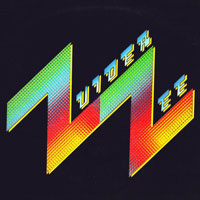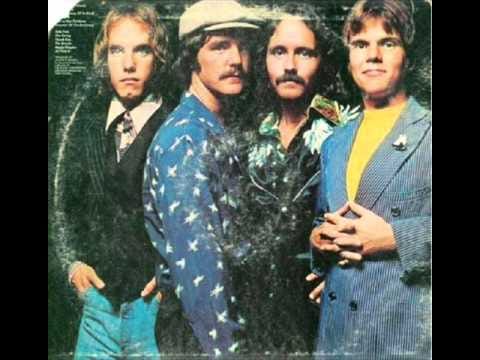Audio Autopsy, 1975: Richard Orange and the Zuider Zee Debut Album, Columbia Records
Melodic and pleasant, their clever nuances may have escaped power poppers. Too light to make it onto FM rock radio, plus the promo clout of CBS had its hands full making their stars even bigger.
Columbia Records was a great place to be in the mid-1970s if you were a fledgling rock band. They were the biggest giant in the land, and could use their corporate muscle to get your record played on radio, and procure prime real estate in record stores.
Or, you could get buried beneath the inevitable weekly avalanche of releases by those artists who were once where you are now: Hungry and struggling, but they managed to somehow take advantage of the dark marble behemoth of The Big Apple that was the imposing “Black Rock.”
Zuider Zee (Zuider like “Cider”), a nascent four-piece from Lafayette, Louisiana, was signed to CBS in ‘74, and had their self-titled debut released the following year.

It just so happens, though, that in 1975, Columbia had their promotional hands full with not one, but two Bob Dylan releases, Blood on the Tracks and The Basement Tapes, with a yet-to-break Bruce Springsteen and his Born to Run that necessitated Columbia’s hands to be all on deck.
And, it was ‘75’s Toys in the Attic (produced by Jack Douglas) that finally broke Aerosmith to US audiences. The Black Rock vinyl mountain, as always, was huge that year.
If CBS prez Walter Yetnikoff and his minions had little to no time, in 1975, to fiddle with a Fairfax, Virginia rookie band named Artful Dodger and their self-titled debut, coincidentally produced by Toys in the Attic producer, Jack Douglas……
What kind of time would they have to push Richard Orange and Zuider Zee?
In 1975, I was transitioning from Music Director at the U of Houston radio station, KUHF (with a daily, 3-hour afternoon soft-rock shift), and spending more time as a 20-year-old part-time DJ with CBS radio affiliate, KLOL-FM 101, the city’s leading “progressive rock” station:
Zuider Zee was clearly “too hard” for my afternoon shift at KUHF, and while it wasn’t my decision, I could certainly see why Bob Wright, Music Director at KLOL, had to nix dropping needles to Zuider Zee vinyl.
By this time, after apparently seeing an address to use on their album, I began communicating by letter with Richard Orange from my SW Houston apartment; we must have exchanged a couple missives each over a several-week span, doing nothing more consequential, really, than shooting the hand-written breeze using a ten-cent stamp.
This should give you a good idea as to the personality of one Mr. Orange…an amiable, man-of-the-people musician, and far from a self-important—sniff—“recording ah-tist.” Apparently, I wasn’t the only one fan-boying on ZZ and Richard:
Cheap Trick’s Rick Nielsen was reportedly an early fan of the band’s. Natives of Rockfield, IL, their self-titled debut wouldn’t be released (by Epic Records, a subsidiary of Columbia) until 1977, produced by the ubiquitous Jack Douglas (there’s that name again)!
“Rick Nielsen called me one night,” Orange recalled in a recent interview: “He was asking about why we weren’t bigger and doing as well as they were. He said: ‘Man, you’re so damn good; do you know where I have your phone number? I have your number right beneath John Lennon’s number. [Friggin’] John Lennon, Richard!’”
[Editor’s Note: A later iteration of Zuider Zee actually opened for the Sex Pistols at the Taliesyn Ballroom in Memphis, TN in January 1978. To read more about that show, and my personal account of seeing their San Antonio, TX stop a few nights later (and enjoying an encounter with Johnny and Sid in the parking lot beforehand), click here]:
From TEELBB to BBOG to FMW to ZZ
Lafayette, Louisiana has never taken on the mantle of “America’s Home of Rock.” Nevertheless, Richard Orange first entered the rock arena at 15, as a member of Lafayette’s late-’60s psychedelic-pop outfit, Thomas Edisun’s [sic] Electric Light Bulb Band, venerated by record geeks for decades, and finally given a belated album release of their own by archivist label, Gear Fab Records, in 2014:
But, even before that, Richard was an 11-year-old folkie, citing Peter, Paul & Mary, the Kingston Trio, and Chad and Jeremy as favorites, loving all things melodic.
This, nevertheless, is too cool to pass up: A 1969 single by TEELBB on tiny local label, Donson (apparently its first, judging by the catalog number, and produced by the label’s owner, judging by the label name), with their cover of Gordon Lightfoot’s “The Circle is Small” originally appearing on his 1968 Back Here on Earth LP for United Artists.
It’s well-executed, with nice harmonies and tasty guitar, with more than competent vocals by Orange (although the single may suffer from being slightly out-of-round):
By the early ’70s, that six-word band morphed into Black Brown Orange and Gray, and Fair Murphy Wormwood, before settling on the far less tongue-arresting Zuider Zee, and moving to Memphis in early ‘73 by way of Jackson, Mississippi.
Memphis placed them in the same city as the new Lords of Power Pop, Big Star, with their critically-lauded #1 Record, recorded at Memphis’ Ardent Studios in 1971 and ‘72, and released in April 1972.

AM Top 40 Hit Radio Goes Tune Deaf; Or Did They Just Not Receive Anything to Play?
Zuider Zee jettisoned the psychedelia in favor of a sound that some say mixed Badfinger with Abbey Road-era Beatles, with a harder touch some find suggestive of glam. I won’t disagree with that assessment, but I do push back on any strict power pop label.
They had nowhere near the prodigious, classic melodic mastery of Raspberries, say, or the deft harmonic touch and immediately catchy melodies of The Rubinoos, Shoes, or later, Jellyfish; not on the Columbia LP, anyway.
Revisiting the album now, though, leaves me wondering how I could’ve missed the delicious word play and surprising melodic twists that only serve to add depth to the genre, not side-step it. I’ll blame it on being 20, and succumbing to the tuneful immediacy of the output of the aforementioned bands.
I can catch up nearly half-a-century later, can’t I? If Raspberries was a bowl of lip-smacking Froot Loops, I’d be happy to add a twist (and shout) of Orange.
“Listen to the Words,” the lead track on the album, comes closest to the power pop vibe of Badfinger with a dash of Big Star. Jangly guitars abound, with 3-part harmonies up front, jump-started by an ear-catching guitar intro…with Richard sounding just a little more Top 40/Ian Lloyd-raspy than I recall.
I could’ve lived with hearing this once an hour segued anywhere between “Love Will Keep Us Together,” “Sister Golden Hair,” and “Rhinestone Cowboy.” But, Columbia didn’t issue this as a single. In fact, stunningly, not a single song from this album was ever released as a single!
Gee, Walter Yetnikoff, Bruce Lundvall, and all the mid-’70s CBS suits: What was wrong with this one?
“I know there are these little McCartney-esque inflections…but when you’re 19, 20 years old, you don’t even realize that you’re copping somebody else’s thing.”
According to a 2018 RockandRollGlobe.com overview, “Orange cops to the Fab Four influence, but [addressing the glam charge] says, ‘I never felt I was very influenced by Marc Bolan and T. Rex, but for some reason writers like to say that.’
“Another thing commonly noted about Zuider Zee is the fact that Orange, not unlike his LA contemporary, the late Emitt Rhodes, had an undeniably McCartney-like vocal quality.
“‘In the earlier stuff,’ he explains, ‘especially Zeenith (an archival 2018 release of previously unheard Zuider Zee material), I know there are these little [McCartney-esque] inflections…but when you’re 19, 20 years old, you don’t even realize that you’re copping somebody else’s thing; you’re really just trying to learn to sing.”
After only a couple songs heard from Zeenith, “Lancelot’s Theme” floats easily to the top for this listener. I can even forgive Richard for the “You can call me Lancelot, thanks a lot” line!
Inventive songwriting ensues, with an arrangement that includes a flute, electric piano, subdued harmonies (that, to this ear, sound wonderfully Jellyfish-y, some 15 years before their debut), and even a stirring modulation 3/4 of the way through that’s preceded by an unexpectedly bouncy syncopation, topped off by a scoop of high Orange falsetto!
Richard continues: “‘Whenever I do a hard rocker, I’m striving to sound like John Lennon. I never set out to say, ‘Well, I want to sound just like Paul McCartney,’ because it was really the kiss of death for a band to sound like someone else. But the vocal cords, they are what they are.’”
Revelation #9
Zuider Zee, live, covers Badfinger’s “No Matter What”:
Apparently, the songs recorded by Zuider Zee from 1972 to ‘74 (that now appear on Zeenith) were infinitely stronger, and even though nothing but demos, were never planned to be included on the Columbia album, except for “Haunter of the Darkness.”
of (in April 2025) honored the lone Columbia Zuider Zee album, marking its 50th anny, along with several other guitar pop/power pop entries of the day that deserved the ears of far more radio listeners and record buyers than they got at the time!👇Girls Just Wanna Have Hits
Despite the lack of a long-term recording career for Zuider Zee, Orange continued to write, produce, and has embraced his love of producing visual art. He landed his “Hole in My Heart (All the Way to China)” with Cyndi Lauper, which, while a hit, got only to #54 on the Billboard Hot 100 in the summer of 1988. It also made it onto the soundtrack to her ‘88 Vibes theatrical release, which co-starred Jeff Goldblum.
Cyndi has mentioned on occasion that her record company (Epic) thought the song was too fast for radio. In fact, she rarely performed the song in concert.
Here’s Richard’s version (on which he curiously flipped the parenthetical title phrase), which he recorded in 2005 for his solo album, Big Orange Sun. Not that he needed to please Epic (or any label for that matter), but may the record (and CD) show that the BPM for the Orange version is a nifty 105. Richard’s jangly power pop game here is huge:
Meet the Beatlesque
For Big Orange Sun, Richard also threw caution to the wind (and metaphoric balls to the proverbial wall), and wrote and produced the ultimate pastiche/tribute track to the Fab Four, and shamelessly (but laudably) called it “Beatlesque.”
Gutsy and adventurous to the point where even Todd Rundgren would dare not attempt, you’ll even hear audio clips of John Lennon in the mix:
For your listening, dancing, and romancing pleasure: The original, complete Zuider Zee 1975 self-titled album on Columbia:









Interesting. I'd never heard of this band--and I listen to A LOT of 70s and 80s music.
For some reason (possibly because of the similarity in names) this reminded me of Richard Strange, who also had quite an obscure career, though in a very different musical genre ;)
LOL @ Thomas Edisun! Great read as per usual.